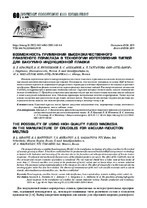Возможность применения высококачественного плавленого периклаза в технологии изготовления тиглей для вакуумно-индукционной плавки

Date
2019Publisher
Another Title
The possibility of using high-quality fused magnesia in the manufacture of crucibles for vacuum-induction melting
Bibliographic entry
Возможность применения высококачественного плавленого периклаза в технологии изготовления тиглей для вакуумно-индукционной плавки = The possibility of using high-quality fused magnesia in the manufacture of crucibles for vacuum-induction melting / Б. Л. Красный [и др.] // Литье и металлургия. – 2019. – № 3. – С. 60-64.
Abstract
Показана перспектива применения крупнокристаллического плавленого периклаза в технологии получения плавильных тиглей методом изостатического прессования. Установлено, что получение материала на основе МgO по бетонной технологии ограничено гидратацией и разрыхлением структуры вследствие образования и последующего разложения брусита. Приведены физико-механические характеристики полученных изделий. Рассмотрено влияние отношения CaO/SiO2 на коррозионную и эрозионную стойкость изделий. Сырьевой материал должен иметь мольное соотношение данных оксидов более 1,7. Проведены испытания прессованных тиглей при получении сплавов на основе никеля, кобальта и олова в вакуумной индукционной печи. Показаны параметры эксплуатации изделий на предприятии. Также изучено влияние засорения материалами тигля при плавке чистого никеля. Установлено отсутствие загрязнения расплава материалами тигля, такими, как диоксид кремния, алюмосиликаты и оксидные плены и др.
Abstract in another language
The prospect of using crystalline fused magnesia (FL LC) in the manufacture technology of melting crucibles by the method of isostatic pressing is shown. It has been established that the production of a material based on MgO using concrete technology is limited to the hydration and loosening of the structure due to the formation and subsequent decomposition of brucite (native magnesia). The physical and mechanical characteristics of the obtained products are given. The effect of the CaO/SiO2 ratio on the corrosion and erosion resistance of products is considered. The raw material should have a molar ratio of these oxides of more than 1,7. Pressed crucibles were tested in the production of nickel, cobalt and tin based alloys in a vacuum induction furnace. The parameters of operation of products in the enterprise are shown. The effect of clogging by crucible materials during smelting of pure nickel has also been studied. The absence of contamination of the melt with crucible materials such as silicon dioxide, aluminosilicates and oxide films, etc., has been established.
View/
Collections
- № 3[29]
